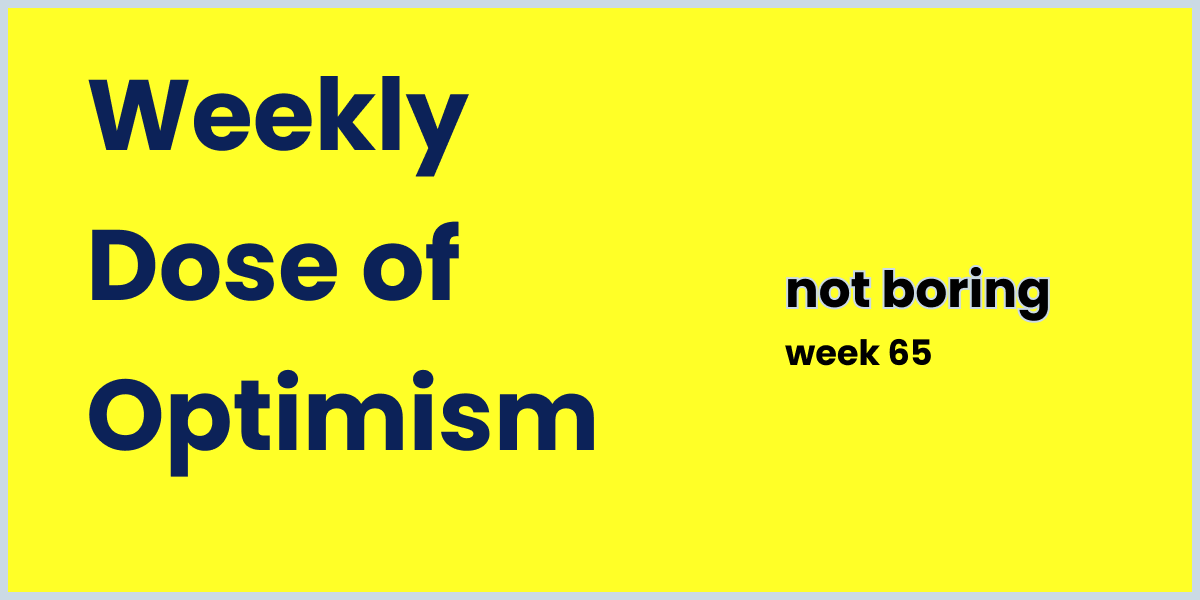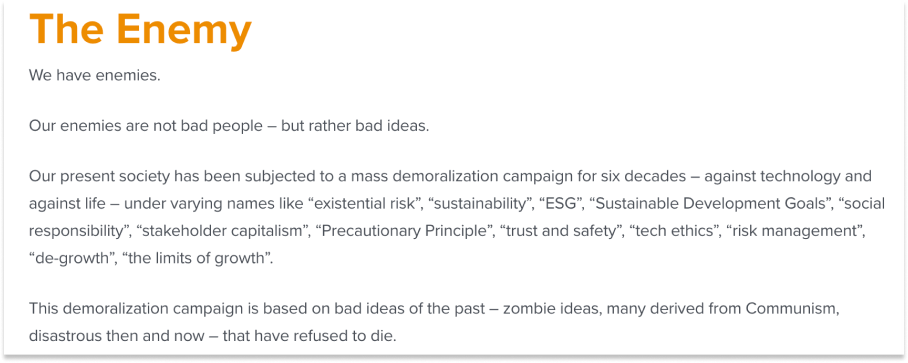Not Boring by Packy McCormick - Weekly Dose of Optimism #65
Weekly Dose of Optimism #65Peace in the Middle East, Techno-Optimism, Scaling Nuclear, Collisons, Direct FileHi friends 👋, Happy Friday and welcome back to our 65th Weekly Dose of Optimism. Things are scary out there. We hope everyone reading this is safe and that things will soon stabilize. Our promise is to share some optimism with you each week. And even in dark times, we intend to keep that promise. Let’s get to it. The Weekly Dose is brought to you by… Plaid You may know Plaid as the company that easily lets you connect and authorize your bank to your favorite finance apps.When that original product dropped back in 2013, it was like magic and unleashed a whole wave of fintech innovation – think Venmo, Chime, and SoFi. In the decade since, Plaid has established itself as one of the leading fintech infrastructure companies and has rolled out a whole suite of products that allow businesses to get the most out of their financial data - including payments, identity verification, and credit. The company also has a particularly unique vantage point on the fintech industry. It partners with both cutting-edge startups and legacy incumbents, has experienced the ups and downs of the general macro environment over the last few years, and, as a financial data network, has an inside view of what’s working in fintech today. Each year, the company publishes its Fintech Spotlight Report. This year’s report, titled “A Focus on Profitability,” covers three main topics: improving profitability, crypto services, and lending. Whether you’re a fintech, lender, banker, investor, or just an interested analyst, you’ll find valuable insights inside the report, which they are making free to download for all Not Boring readers. (1) A Venture Approach to Peace By Dror Poleg
There’s a lot going on in the world right now. Things are quite fragile. It’s a particularly challenging time to remain optimistic about the future. Peace in the Middle East seems to be particularly a out of the money bet. Traditional means of diplomacy and peacebuilding don’t seem like they’ve gotten us very far. We, of course, don’t have the answer here. But our friend, Dror Poleg, is working on an interesting idea that, at scale, could be an alternative path towards peace. The basic premise of his plan is that stable peace hinges on increased trade, investment, and positive-sum interaction among people in the Middle East. To bring that premise to life, he’s launching a fellowship called The Old New Fellowship, which will bring together entrepreneurs and thinkers working to increase and facilitate investment, trade, and understanding between people in the region, both Muslims and Jews. Old New will also give grants to the most promising people. The program is modeled off of Tyler Cowen’s Emergent Ventures, which supports "entrepreneurs and brilliant minds with highly scalable, 'zero to one' ideas for meaningfully improving society." You can learn more details about the program here. I (Packy) have had the pleasure of working with, reading, and being friends with Dror for the better part of a decade, and he’s always impressed me with his insight, calm, and ability to stay above the fray and see things as they really are. We don’t think Dror would contend this program alone can solve all conflict in the Middle East, but we think it’s an important first step and encourage anyone in the region who has ideas they want to put into practice to apply. (2) The Techno-Optimist Manifesto Marc Andreessen for a16z
Packy here. If you're a regular reader of The Weekly Dose of Optimism, you've likely already read Marc Andreessen’s recent masterpiece, “The Techno-Optimist Manifesto.” I cited it in Riskophilia on Tuesday. If you haven’t, stop reading and go read it now. Marc’s manifesto is fiery and has predictably generated a lot of pushback, some cartoonish (looking at you, TechCrunch) and some thoughtful and nuanced, like this markup from Ben Reinhardt and this thread from Stewart Brand. Me? I just love it. I know that’s not a particularly critical take. And there are pieces of it that not everyone will agree with. I think if the piece were titled, “A Study of the Pros and Cons of Techno-Capitalism and Alternative Approaches,” it would be a little one-sided. But it was a manifesto, and the point of a manifesto is to serve as a rallying cry. They’re supposed to be extreme. They’re supposed to make people think. This section got people especially riled up: That’s a lot of sacred cows! But the fact is, the mainstream conversation has taken those things as unquestioned and unquestionable Good Things. At the very least, they should be able to be questioned. Sustainability is a good goal… but at what human cost? Existential risk is a fine thing for people to think about and plan against… but not at the expense of progress. The Precautionary Principle is dangerously one-sided, as I wrote about Tuesday. People in tech should obviously be ethical, but the “tech ethics” push is also part of a broader cultural trend that focuses too much on the potential negatives or limitations of technological advancements, rather than celebrating their possibilities for progress and human betterment. De-growth and the limits of growth… are just plain ass-backwards. They don’t work. And any ideology that is willing to trade human life, health, happiness, and flourishing for anything deserves scrutiny. And upon any serious scrutiny, de-growth and the limits to growth — a 1972 report from the Club of Rome — fall apart. I believe that humans are good, actually, and that we can collectively make our lives better. I’m glad that Marc wrote something for those of us who share that belief to rally around. For a thorough (if one-sided) and data-driven analysis of many of the above points, I highly recommend Johan Norberg’s The Capitalist Manifesto, which I started reading after seeing John Carmack tweet about it. (Marc lists Norberg in his list of Patron Saints of Techno-Optimism). I’m a card-carrying techno-capitalist and techno-optimist, and even I was surprised by a lot of the pro-capitalist arguments he made. (Disclosure: I am an advisor at a16z crypto, but I think you know me well enough at this point to know that we’re covering this because it’s something I believe in.) (3) How to Scale Nuclear Power Ryan McEntush for a16z
OK, we’re sorry for the a16z love, but those guys were on fire this week. Ryan McEntush, an American Dynamism investor at a16z, published a super thorough, but digestible primer on the history and future of nuclear energy. If Andreessen thinks we “should place intelligence and energy in a positive feedback loop, and drive them both to infinity,” nuclear energy will most likely have to play a big role in that. McEntush’s essay does a strong job explaining how we ended up with the current state of affairs in nuclear — unfounded safety concerns, regulation, special interests, etc. Thankfully, he sees that progress is unfolding as the “tides are turning” with the public’s perception of nuclear and startups race to work around both regulatory and economic barriers of nuclear progression. Of course, this is a particular area of interest here at Not Boring. Next week Packy is launching a new podcast called Age of Miracles — it’s a podcast about the industries helping to create a world of superabundance and Season 1 is all about nuclear. (4) Figure 01 We’re going to need a lot of energy if we’re going to electrify our workforce. In a development sure to send shivers down the spines of techno-optimism’s enemies, Figure released a bipedal humanoid robot this week (just 12 months after the company was started…). It’s an important … step … towards the company’s stated goal to “develop general purpose humanoids that make a positive impact on humanity and create a better life for future generations. These robots can eliminate the need for unsafe and undesirable jobs — ultimately allowing us to live happier, more purposeful lives.” Now to some, that’s a pretty scary proposition. If Figure and competitors like Tesla Bot are successful, they could eliminate millions of jobs. The human mind is really good at forecasting out that downside case: millions of lost jobs = bad. And to be fair, it kind of looks like Terminator. The human mind is less good at forecasting out the upside case: millions of undesirable jobs filled by robots, freeing up humans to focus their time and energy on higher-level pursuits. What those will be is harder to predict and so we tend to focus more on the downside, knowable scenario. Plus, as Packy wrote about in his piece on Formic, the fear of lost jobs from automation is overblown. Factories face a labor shortage that robots can help fill, and cheaper robot labor means cheaper things, lower inflation, and ultimately, abundance. We’re rooting for Figure and that upside case. (5) Direct File From the IRS
This is probably the first and last time you’ll hear us cheering for IRS-built software in the Weekly Dose, but Intuit had it coming. The company has engaged in a 20-year lobbying effort to prevent the US from doing what other advanced countries have done: make tax filing free and simple for its citizens. Tax season isn’t fun — giving away a quarter to a half of your hard-earned money is the least fun thing imaginable — but Intuit has poured its significant resources into making it even less fun. Our favorite is the company’s efforts to stop a ReturnFree Tax System — pre-filing with the information the government already has. As it stands, we have to tell the IRS how much we owe, and they either say “OK, cool, that’s right” or “No that’s not how much you owe, you’re in trouble now.” If they knew the whole time, why tf do we have to go through all that headache? Intuit, mainly. It’s exactly the kind of regulatory capture that Bill Gurley railed against, and the fact that Intuit was able to wield it not against startups, but against the government itself, shows how powerful that revolving door can be. Well, we have goos news: that reign of terror has ended. Starting in 2024 (ie when we pay our 2023 taxes), residents in 13 states will be able to use Direct File, the IRS’ free electronic tax filing pilot program. This is a big win for regular folk who no longer have to pay extra for the pleasure of paying the government taxes. That racket seems to be coming to a close with the rollout of Direct File next year. There’s work to be done. All 50 states should get to experience this bliss. The government still needs to prove it can build something better than healthcare.gov. We want to see a ReturnFree Tax System. But for now, paying taxes might just get a little bit less miserable. That’s all for this week. If you have some time this weekend, check out Plaid’s Fintech Spotlight. We’ll be back in your inbox on Tuesday. Thanks for reading, Dan + Packy |
Older messages
Riskophilia
Thursday, October 19, 2023
Learning to Love Risk
Weekly Dose of Optimism #63
Friday, October 6, 2023
Malaria Vaccine, Nobel Prizes, Focused Ultrasound, Poverty Reduction, Safe Superintelligence, Boats
Anduril: Acquiring Prime
Tuesday, October 3, 2023
Analyzing Anduril's M&A Strategy and the Future of Defense
Weekly Dose of Optimism #62
Friday, September 29, 2023
Big Tech Roundup, Animal AI, Nuclear Microsoft, Helion, Frank the Tank
Array Labs: 3D Mapping Earth from Space
Tuesday, September 26, 2023
Satellite Clusters and the Quest for the Holy Grail of EO
You Might Also Like
🔮 $320B investments by Meta, Amazon, & Google!
Friday, February 14, 2025
🧠 AI is exploding already!
✍🏼 Why founders are using Playbookz
Friday, February 14, 2025
Busy founders are using Playbookz build ultra profitable personal brands
Is AI going to help or hurt your SEO?
Friday, February 14, 2025
Everyone is talking about how AI is changing SEO, but what you should be asking is how you can change your SEO game with AI. Join me and my team on Tuesday, February 18, for a live webinar where we
Our marketing playbook revealed
Friday, February 14, 2025
Today's Guide to the Marketing Jungle from Social Media Examiner... Presented by social-media-marketing-world-logo It's National Cribbage Day, Reader... Don't get skunked! In today's
Connect one-on-one with programmatic marketing leaders
Friday, February 14, 2025
Enhanced networking at Digiday events
Outsmart Your SaaS Competitors with These SEO Strategies 🚀
Friday, February 14, 2025
SEO Tip #76
Temu and Shein's Dominance Is Over [Roundup]
Friday, February 14, 2025
Hey Reader, Is the removal of the de minimis threshold a win for e-commerce sellers? With Chinese marketplaces like Shein and Temu taking advantage of this threshold, does the removal mean consumers
"Agencies are dying."
Friday, February 14, 2025
What this means for your agency and how to navigate the shift ͏ ͏ ͏ ͏ ͏ ͏ ͏ ͏ ͏ ͏ ͏ ͏ ͏ ͏ ͏ ͏ ͏ ͏ ͏ ͏ ͏ ͏ ͏ ͏ ͏ ͏ ͏ ͏ ͏ ͏ ͏ ͏ ͏ ͏ ͏ ͏ ͏ ͏ ͏ ͏ ͏ ͏ ͏ ͏ ͏ ͏
Is GEO replacing SEO?
Friday, February 14, 2025
Generative Engine Optimization (GEO) is here, and Search Engine Optimization (SEO) is under threat. But what is GEO? What does it involve? And what is in store for businesses that rely on SEO to drive
🌁#87: Why DeepResearch Should Be Your New Hire
Friday, February 14, 2025
– this new agent from OpenAI is mind blowing and – I can't believe I say that – worth $200/month




